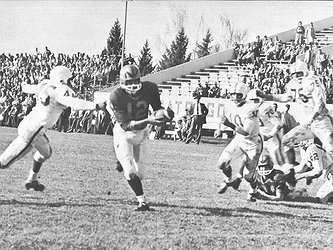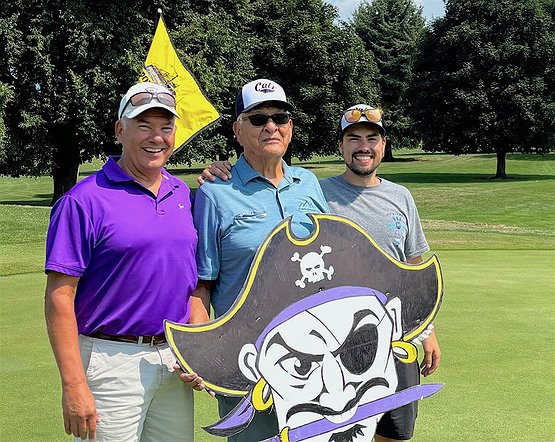Tribute to a champ: Darryl Dupuis inducted to Montana Indian Athletic Hall of Fame
Although Darryl Dupuis is most noted as a standout football player and coach, two champion wrestlers nominated him for the Montana Indian Athletic Hall of Fame.
Dupuis, who celebrates his 90th birthday in November, is among this year’s inductees. A member of the Confederated Salish and Kootenai Tribes, he was nominated by Hall of Famers Wes Knudsen of Polson and John Neiss of Ronan.
“Coach Dupuis has always been an important influence in my life,” said Knudsen, the first Polson wrestler to ever claim a state title and a longtime Columbia Falls coach and teacher.
Dupuis, who began coaching Knudsen in middle school, stressed the importance of gaining a good education in high school and beyond, and “was always positive and encouraging,” Knudsen said.
“He also pointed me to the wrestling mat my freshman year,” he added. “This led me to, and paid for, my college education and career.”
Coach Dupuis still remembers that conversation. Knudsen was good at both wrestling and basketball, and asked Dupuis which winter sport he should pursue in high school. “I said, ‘Wesley, I think that you would be more successful in wrestling than basketball.’”
Knudsen’s wrestling prowess not only earned him a state championship as a sophomore at 112 pounds, but second place as a junior and senior, and an athletic scholarship at UM that fueled his long career as a high school coach and teacher.
Dupuis said his own path to athletic and professional success was also helped along by advice from his high school coach in the early 1950s, Royal Morrison. He was a sophomore when he played his first varsity season as defensive back, and then played quarterback his junior year, when the only game they lost was when Dupuis was sidelined by a sprained ankle.
“We won the rest of our games that year, and the coach said, ‘Darryl, you better get to work on your grades. You're going to college,’” recalls Dupuis. “That's the first time anybody ever – any of my teachers or anybody – talked to me about college.”
He made the honor roll during his first semester as a senior and by springtime, he had received a recruiting letter from the University of Montana in Missoula (then called Montana State University).
He played football his freshman and sophomore years before joining the Army in January 1955 and serving in Korea for two years. He came back and played for Wenatchee Junior College, where he met his wife, Rita. “He was a pretty good-looking guy,” she recalls.
After a year as their quarterback, he was wooed by Montana State College (now MSU). As a junior and a senior, he led the Bobcats to their third and fourth consecutive victories over the Grizzlies in the fabled Brawl of the Wild. The second win was 40 to 6.
Dupuis earned a degree in physical education with a minor in math and science at Bozeman, and taught and coached in Glasgow and Bozeman before applying for the position of head football and track coach, P.E. teacher and athletic director in his hometown of Polson.
That was in 1965, and he spent the next 30 years in the district. As head football coach from 1965-1976, he helped the Pirates secure second place in Class A in 1969 and was named Class A Coach of the Year. As head track coach, he led the Pirates to a state Class A victory in 1974, and earned another nod as Coach of the Year. He was also head wrestling coach from 1968-1973.
He coached the East-West Shrine Game in 1960 before returning to Polson, was a referee for the 1980 game and was inducted into the Montana High School Association Officials Hall of Fame in 1984.
"We wanted them all to succeed"
Dupuis earned a master’s degree in school administration and became middle school principal in 1978, a post he held until 1995.
Even after retirement, he stayed busy. He was recruited by his old friend and former football foe Joe McDonald to help launch Salish Kootenai College – first by wrangling classroom space in the then-vacant Lincoln Building, and post-retirement, by serving as the SKC development officer for three years (the college’s Silver Fox Golf Course is dedicated to him).
He also served two years on the CSKT Tribal Council after his older brother, Donnie Dupuis, died midway through his term.
While he mentored many Native American students and student-athletes during his tenure as a coach, teacher and administrator, Dupuis says he didn’t treat native kids “any different than anybody else.”
Still, his presence seemed to help those kids feel more comfortable, especially when they moved to Polson from smaller schools, like Elmo.
“We didn't have many tribal member teachers at that time. And slowly they started to come in there and get hired,” Dupuis said. “And that makes a difference to a lot of those kids and families.”
He also had a rapport with parents, and told them, “if they have problems, come to me. We'll see what we can do.”
“We wanted them all to be successful,” he added. “I think it worked pretty good.”
Darryl and Rita raised five children – daughters Sherry Dupuis and Jolene Bryant, and sons Gary, Steve and Scott. They have 10 grandchildren and four great-grandchildren.
Rita is clearly still partial to the man she married 67 years ago. “I have been on a whirlwind ride with him and it's been wonderful,” she said.
The 10th annual induction ceremony for the Montana Indian Athletic Hall of Fame will be held from 2-6 p.m. Nov. 23 at the Carroll College Campus Center in Helena and features a keynote address by Olympic gold medalist Billy Mills. For more information, visit www.facebook.com/montanaindianathletichof/.





